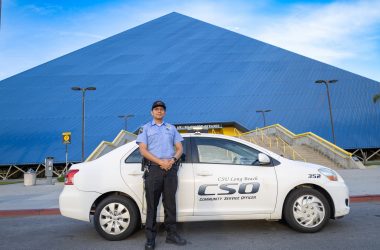A scheduled Information Technology maintenance task caused about 400 Cal State Long Beach employees to lose access to their emails last Wednesday and Thursday, primarily hitting faculty and staff from the College of Liberal Arts.
History professor Jeffrey Blutinger, who was in the middle of organizing a week-long event during the maintenance, said he is concerned about the Information Technology Services’ lack of communication.
“Just like last year, when Beachboard went down … the tech people never warn us when things like this happen,” Blutinger said. “This was a planned upgrade, but ITS had not bothered to tell us what their plans were. Unfortunately, this time, their plan didn’t go according to plan.”
According to the CSULB ITS webpage, faculty and staff lost access to their email accounts and various other campus resources, including BeachNet+ WiFi, network printers, file shares and home directories. The listing also states that ITS had planned to restore access to these services on the same day, on Wednesday at 8 p.m., but was unable to resolve the incident until 4:30 p.m. the following day.
Despite the information posted on the ITS webpage, Blutinger and a few other professors said ITS was inefficient in alerting people who depended heavily on campus technology.
“It was impossible to find the information on the CSULB website, and I was not in the position to find out what was going on,” Blutinger said. “I didn’t know something was wrong until [Dean David Wallace] called me to tell me my emails were bouncing back undelivered.”
Blutinger said he believes that faculty was not evenly affected, and that problems persisted for random faculty members.
Bill Mohr, an associate English professor who experienced issues last week, said he was mainly concerned about what ITS will do to better handle future problems.
“I had two important emails that were never delivered, but what’s done is done,” Mohr said. “My question is, why wasn’t a text message sent out? Emergency alerts are available through text, so they obviously have the capacity. I understand this is not a life or death situation, but this is an important thing.”
As for Butlinger, he said that despite the extra hassle, he is thankful he was able to find other ways to coordinate his event.
“We went back to 19th century technology, carrying messages by hand, meeting people to make sure all arrangements would be made,” Butlinger said. “Finally, [Dean Wallace] passed my phone number to the right people to get my email restored.”
After the incident was resolved, Butlinger called on to his department’s Academic Senate representative and responsible administrative oversight committees via the CLA forum, asking for better ways to handle IT problems.
“When important technological services are interrupted, they need to tell people,” Blutinger said in the message. “Since email cannot be used in these circumstances, perhaps a prominent notice on the webpage explaining what to do would work.”
Janet Foster, associate vice president of ITS, sent an email to Wallace yesterday assuring that last week’s problem was not a security breach and apologizing for the inconvenience the disruption caused. Wallace forwarded the email to CLA faculty.
“We realize that our communications can be improved,” Foster said via email. “If similar incidents occur in the future, a webpage will be available with information that is easy to find for end users … We will also look into the possibility of using text messages and other means of communication if campus email is not available.”
After reading Foster’s email, Mohr said he thinks ITS should have prepared for such an occurrence ahead of time.
“It doesn’t seem like they learned a lesson from this experience,” Mohr said. “To say they will look into the possibility of using text messages [is] a kind of vague bureaucratic response. I’d like to see them immediately say ‘we will send a text message’ — that would be addressing the issue.”
Meanwhile, Bryan Jackson, director of service management operations, said text messaging may still not be a perfect solution.
Foster said that corresponding passwords to faculty members’ BeachID usernames were deleted, which is what resulted in the lack of access.
“[When last week’s ITS problem occurred], we tried to reach anyone who had an alternate email on record, but we realized not everybody had one,” Jackson said. “As with text messaging, the idea would require users entering their text message information — the data has to be there.”



